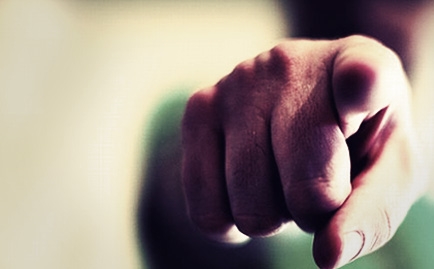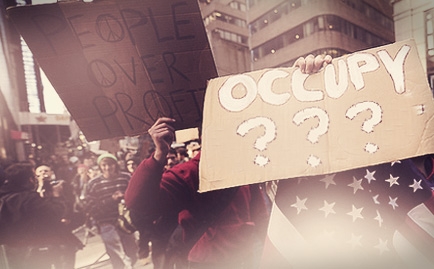
I am absolutely fascinated by Occupy Wall Street (or as they hashtag it on The Twitter—#OWS). People of all ethnicities and socioeconomic classes are standing in the street, holding up signs that read “We Are the 99 Percent” and “People Before Profits,” and they are desperate for something (or anything, or everything) to change in our economic system. The top 1 percent in this system grows richer and the rest of us—never mind the truly impoverished and desperate the world over—are the 99 percent. Somehow, this leaderless movement without an articulated agenda other than “this current system is unbearable” is growing, spreading to the cities across the United States and even headed northward to my nation, too. The media is in three-ring-circus-mode, the talking heads are frustrated without soundbites for mindless consumption, the labels aren’t sticking and should we be afraid? Are they communists? Socialists? Revolutionaries? Or just regular folks like us? What exactly is happening and what do they—what do we—want?
I love a good protest. I admit it—I love to stick it to The Man. I’m a true western Canadian kid, always a bit distrustful of the establishment and the elite, throwing my lot with the underdog and the outsider every time. I do like being a bit on the edge of things, but Occupy Wall Street is fascinating me for an entirely different and deeply spiritual reason. At the heart of the protest, I believe what the protesters are calling for is repentance. They are holding a mirror up to our corporations, our governments, to the 1 percent wealthiest and to those of us in the 99 percent and saying: Look here at what our greed has done.
Look at how greed has robbed us all. Look at how the greed has robbed the world, our environment, our humanity, our old and our young, our brothers and our sisters. Look at how our greed has robbed us of compassion and humility. Look at how our mindless consumption has harvested our education, our wisdom, our attention, our creativity, our worship. Look at how greed has disenfranchised us all, making our votes and our voices worthless in the face of corporate greed.
Unlikely and eclectic prophets with cardboard signs using port-a-potties, perhaps, but their call to repentance isn’t just for government or for the 1 percent or a particular political persuasion—it’s for us all. Accountability is a beautiful, terrible thing.
I want to hold the 1 percent accountable—but I want to hold myself accountable, too.
As followers of Jesus, is this our economic awakening? Is this our time to speak out prophetically about the Christian values of contentment, faith in God’s provision and our responsive generosity? Are we making choices with our own money that affirms our allegiance to God’s way of doing things first? Are we living the economics of love? The truth is that we are all part of the problem when we capitulate to our culture’s fascination with greed, materialism, consumerism, entitlement, irresponsibility, their assertions that we are what we own (or charge on the credit card, at least).
I am inspired by those men and women in positions of leadership that make the choices for people before profits—for instance, the businesses that provide adequate health care, maternity leave, sick leave and a living wage to their employees. And I’m inspired by people who live more simply in our world today, the ones who truly trust God and live content. Because I want to be one of them.
I want to trust God more, I want to say that my money demonstrates my love and trust for God just as much as my marriage, my mothering, my politics, my community, my friendships, my writing, my work. The call to repentance on Wall Street and Bay Street is a call to repentance for me, too. The golden calf (or bull, whatever) of Wall Street demands worship. I am learning to choose faithfulness, contentment, responsibility and generosity in the rhythms of a life dedicated to the ways of Jesus and real personhood, affirming our Maker as creator and giver and sustainer of it all.
God’s economic system sets us free from the love of money. God speaks of His people living lives of gracious and generous giving, of prudent and wise decisions (something never very popular in our culture), our time and money and love, our lives, a sowing toward life.
In our family, we are learning to make choices with our money that affirm our allegiance to God’s way of doing things. I’m learning—and I have so far to go—about living the economy of love, making the loving choices on everything from our coffee to housing, food to entertainment, debt eradication and generous giving. Ethical and sustainable, fair-trade and handmade are buzz words, but I believe they are God’s words because, at their heart, they are about people and life instead of power and loot-piling. It starts small, here, in my own house and budget. But #OWS started small and the thousands are there, all ages, all races, all classes, now waking up and speaking out.
And I hear it’s a pretty good way for truth to spread, from person to person, from choice by choice, each of us making space for God every day. Accountability, yes; but the repentance is in the turning away from the old ways and instead traveling on The Way.
Sarah Styles Bessey is a non-profit marketing director, writer and simple living/social justice wannabe. She lives in Abbotsford, British Columbia with her husband and three tinies. She blogs at www.emergingmummy.com. This article was reprinted with permission from A Deeper Story.





















